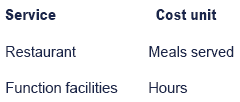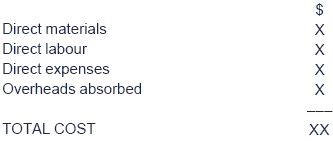Service and operation costing
Service costing is used when an organisation or department provides a service.
There are four main differences between the 'output' of service industries and the products of manufacturing industries.
- Intangibility - output is in the form of 'performance' rather than tangible ('touchable') goods.
- Heterogeneity - the nature and standard of the service will be variable due to the high human input.
- Simultaneous production and consumption - the service that you require cannot be inspected in advance of receiving it.
- Perishability - the services that you require cannot be stored.
Suitable unit cost measures for service/operation costing
Unit cost measures for service costing
One of the main difficulties in service costing is the establishment of a suitable cost unit.
In some situations it may be necessary to calculate a composite cost unit.
- A composite cost unit is more appropriate if a service is a function of two variables.
- Examples of composite cost units are as follows:
- tonne-miles for haulage companies
- patient-days for hospitals
- passenger-miles for public transport companies
- guest-days for hotel services.
Alternatively, service organisations may use several different cost units to measure the different kinds of service that they are providing.
- The following cost units might be used by a hotel:

Cost per service unit
The total cost of providing a service will include labour, materials, expenses and overheads (the same as the costs associated with the products produced in manufacturing industry).

- In service costing, it is not uncommon for labour to be the only direct cost involved in providing a service and for overheads to make up most of the remaining total costs.
- In service costing it is sometimes necessary to classify costs as being fixed, variable or semi-variable. If costs are semi-variable, it is necessary to separate them into their fixed and variable constituents using the high/low method.
- The cost per service unit is calculated by establishing the total costs involved in providing the service and dividing this by the number of service units used in providing the service.
- The calculation of a cost per service unit is as follows.
|
Created at 6/28/2012 12:04 PM by System Account
(GMT) Greenwich Mean Time : Dublin, Edinburgh, Lisbon, London
|
Last modified at 11/14/2012 12:29 PM by System Account
(GMT) Greenwich Mean Time : Dublin, Edinburgh, Lisbon, London
|
|
|
|
 |
Rating
:
|
 Ratings & Comments
(Click the stars to rate the page) Ratings & Comments
(Click the stars to rate the page)
|
 |
Tags:
|
|
|
|
|